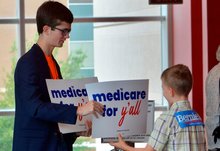Found 433 resources.
0
0
0
The monthly benefits provided by SNAP enhance the food purchasing power of eligible low-income individuals and families. However, as described by many studies, including one by the Institute of Medicine, the greatest shortcoming of SNAP is that benefits for most households are not enough to get through the entire month without hunger or being forced to sacrifice nutrition quality. This limitation persists even in the face of overwhelming evidence on the gains from more adequate monthly SNAP benefits.This paper analyzes why SNAP benefits are inadequate, reviews the body of research showing...
Topics: Food insecurity, Legislation & Policy, Low-income, Nutrition, Research
 Shared by Housing Is
on Mar 1, 2019
Shared by Housing Is
on Mar 1, 2019 0
0
0
This report looks at school breakfast participation and policies in 76 large school districts across the country to evaluate successful practices in reaching more low-income children with school breakfast. This is a companion report to the School Breakfast Scorecard. Also check out our interactive school breakfast participation map.
Topics: Child welfare, Early childhood, Education, Food insecurity, Low-income, Nutrition
 Shared by Housing Is
on Mar 1, 2019
Shared by Housing Is
on Mar 1, 2019 0
0
0

The 2019 state legislative season is in full swing, and SchoolHouse Connection is hard at work on 12 bills in 7 states (IN, KY, ME, NV, TN, TX, UT). We’re also supporting legislative advocates in 4 additional states (AZ, CA, MD, WA), and anticipate additional bills to be filed in LA, MO, NJ, and NC.
Topics: Child welfare, Education, Funding, Homelessness, Housing, Legislation & Policy, Low-income, Youth
 Shared by Housing Is
on Feb 28, 2019
Shared by Housing Is
on Feb 28, 2019 0
0
0

The city says it plans to move ahead with a costly, stopgap renovation of a New Orleans jail building to house dozens of inmates with mental health issues — but it also wants to keep its options open.
Topics: Criminal justice, Housing, Legislation & Policy, Low-income, Mental health, South, Supportive housing
 Shared by Housing Is
on Feb 28, 2019
Shared by Housing Is
on Feb 28, 2019 0
0
0

In a typical year, Cincinnati and Hamilton County have about 600 young adults between the ages of 18 and 24 staying in local homeless shelters, said Bonita Campbell, vice president of homeless youth services for Lighthouse Youth & Family Services. The KEYS plan aims to cut that number in half by 2020 and continue to reduce it from there, she said. To reach those goals, the plan is focused on the specific needs of young adults and how they differ from the needs of older people experiencing homelessness, Campbell said.
Topics: Homelessness, Housing, Low-income, Youth
 Shared by Housing Is
on Feb 28, 2019
Shared by Housing Is
on Feb 28, 2019 0
0
0
In this study, researchers conduct a literature review across public health, environmental health, medical, sociology, and urban planning journals to synthesize the research on the mental health effects of rat infestations on residents living in urban neighborhoods.
Topics: Health, Housing, Low-income, Mental health, Research, Safety
 Shared by Housing Is
on Feb 28, 2019
Shared by Housing Is
on Feb 28, 2019 0
0
0
Over the past two decades, criminal justice reform has focused on evidence-based interventions to prevent arrests and incarceration and to facilitate community reintegration. These initiatives represent a movement toward a less punitive, more holistic approach to public safety, targeting critical social factors that lead to and perpetuate criminal justice involvement. Because housing problems are often a key underlying factor for people’s involvement with the criminal justice system, there are ways housing interventions can help lessen criminal justice involvement. Decriminalizing...
Topics: Criminal justice, Homelessness, Housing, Legislation & Policy, Low-income, Research, Stability
0
0
0
Welcome to the Food Research & Action Center’s winter issue of ResearchWire. This quarterly newsletter focuses on the latest research, reports, and resources from government agencies, academic researchers, think tanks, and elsewhere at the intersection of food insecurity, poverty, the federal nutrition programs, and health.
Topics: Child welfare, Food insecurity, Funding, Health, Legislation & Policy, Low-income, Nutrition, Research, Youth
0
0
0
The development of new digital telecommunications capabilities combined with a persistent digital divide leaves the public sector with enormous responsibilities to promote network quality and deliver equitable access—but it can only do so by sensibly splitting regulatory responsibilities between the national and local levels. Unfortunately, news out of Washington, D.C. reveals the federal government has overstepped its appropriate role, constricting local governments’ abilities to craft locally tailored solutions.
Topics: Broadband, Community development, Legislation & Policy, Low-income
0
0
0
With the active support of their residents, HABG converted a 34-passenger bus donated by Warren County Public Schools. The new mobile grocery store will offer fresh fruits and vegetables to families who currently live in a 'food desert' where the cost of eating healthy can be beyond their reach.
HAGB's new mobile grocery store will visit public housing developments and other low-income neighborhoods in Bowling Green to help residents lower their food costs by offering affordable groceries, including fresh produce grown at HAGB. More than 90 residents were surveyed and almost...
Topics: Food insecurity, Health, Housing, Low-income, Nutrition, Place-based
 Shared by Housing Is
on Feb 28, 2019
Shared by Housing Is
on Feb 28, 2019 0
0
0

For many years, the vulnerabilities of children experiencing homelessness have been glossed over on the assumption that their innate resilience would overcome the impact of homelessness. As someone who worked in the field, I would often hear, “Oh, they’ll never remember.” Today we know better. We know more about how the brain develops and about how trauma impacts brain development. There is a growing recognition among providers that these early years are critical for establishing a foundation for emotional, mental, and physical wellbeing, and that we don’t get a second chance at early...
Topics: Early childhood, Education, Homelessness, Housing, Low-income, Research, Safety, Stability
 Shared by Housing Is
on Feb 21, 2019
Shared by Housing Is
on Feb 21, 2019 0
0
0
As the US Department of Housing and Urban Development (HUD) prioritizes programs to help households receiving rental assistance achieve economic self-sufficiency, researchers, policymakers, and advocates debate the utility of work requirements as an effective pathway toward economic self-sufficiency and the risks of offering rental assistance on a conditional basis. This study contributes additional evidence suggesting that work requirements, when implemented gradually and in context with hardship exemptions and local supports, can boost annual household income, earnings, and the adult-...
Topics: Asset building, Housing, Legislation & Policy, Low-income, Research, Workforce development
 Shared by Housing Is
on Feb 21, 2019
Shared by Housing Is
on Feb 21, 2019 0
0
0
The Addressing Healthcare’s Blindside in Albuquerque’s South Side (AHBASS) collaborative participated in the BUILD Health Challenge’s first cohort with the intention of “making the healthy choice, the easy choice” for community members. Now you can learn about their strategies, approaches, application of the BUILD principles, and outcomes in this new case study documenting their work. Follow along in this case study and see how this Albuquerque, NM, based team addressed chronic disease and self-management in their community. Together, they established a multi-sector collaboration that...
Topics: Data sharing, Food insecurity, Health, Low-income, Nutrition, Partnerships
0
0
0
Integrating health care data with data from other sectors helps address the holistic needs of individual patients while informing the development of population-level programs and policies that can improve outcomes, both in health care and other sectors. This paper provides guidance for those in non-health care sectors (e.g. housing, social services, community-based organizations) on effectively engaging and advancing conversations with health care stakeholders about collaborating to share data, focusing on the specific stakeholder of hospitals/health systems.
Topics: Health, Housing, Low-income, Medicaid / Medicare, Partnerships
0
0
0

A glossary for the emerging Democratic health care debate.
Topics: Health, Legislation & Policy, Low-income, Medicaid / Medicare, Seniors
0
0
0

Sen. Ben Allen (D-Santa Monica) wants to eliminate Article 34 of the state Constitution, which requires a citywide public vote before new low-income housing projects that receive public funding are built. The provision was added to the Constitution through a ballot initiative in 1950, and Allen said it was a relic in need of repeal.
Topics: Housing, Legislation & Policy, Low-income, West Coast
0
0
0
John King served in President Barack Obama’s cabinet as the 10th U.S. Secretary of Education. Secretary King is one of the most prominent voices on the connections between housing policy and education policy, particularly with respect to pervasive socioeconomic and racial segregation. We sat down with Secretary King in Los Angeles to discuss the state of modern-day school and housing segregation, why he prioritized integration while in office, promising practices on both the education and housing fronts, and why education advocates must also be housing advocates.
“As citizens, we need to...
Topics: Child welfare, Education, Homelessness, Housing, Legislation & Policy, Low-income, Partnerships, Youth
0
0
0
The Battered Women’s Shelter in Akron has gotten funding from HUD to cover rent and other living expenses for domestic violence victims after they leave shelters for the past decade. HUD has now approved $1.7 million to be distributed to other Ohio cities for this purpose.
Topics: Domestic violence, Funding, Homelessness, Housing, Legislation & Policy, Low-income, Midwest
0
0
0
More tan 1.3 million homeless students K-12 have been identified in America's public schools.
Topics: Child welfare, Education, Homelessness, Housing, Legislation & Policy, Low-income, Youth
0
0
0

The Board of Supervisors on Tuesday gave the green light for San Diego County to apply for up to $125 million in state funding to help people get off the streets and receive mental health treatment.
Topics: Funding, Homelessness, Housing, Legislation & Policy, Low-income, Mental health, Stability, Substance abuse, West Coast
0
0
0
As the previous shutdown lingered, officials worried what running out of money could mean for 1.1 million low-income households.
Topics: CLPHA, Funding, Housing, Legislation & Policy, Low-income
0
0
0
This report identifies services that help low-income individuals and households achieve upward economic mobility and explores how affordable housing providers offer them. We begin by presenting key economic mobility concepts and definitions. We then discuss the research evidence on interventions across sectors and disciplines that help individuals and households to achieve upward economic mobility. In the third section of this report, we present our findings from interviews with leading organizations and initiatives in the field. Finally, we discuss challenges for affordable housing providers...
Topics: Asset building, Housing, Legislation & Policy, Low-income, Research, Workforce development
 Shared by Housing Is
on Feb 14, 2019
Shared by Housing Is
on Feb 14, 2019 0
0
0
More low-income children across the country are getting the nutrition they need to learn and thrive through the School Breakfast Program, according to the annual School Breakfast Scorecard, released by the Food Research & Action Center (FRAC).
Topics: Child welfare, Food insecurity, Health, Low-income, Nutrition
 Shared by Housing Is
on Feb 14, 2019
Shared by Housing Is
on Feb 14, 2019 0
0
0
During CLPHA’s Education Working Group Webinar on addressing school attendance at PHAs, representatives from the King County Housing Authority and the national nonprofit Attendance Works presented on tools for addressing chronic absenteeism, as well as strategies for fostering a culture of attendance among residents.
Topics: Attendance, CLPHA, Dual-generation, Education, Housing, Housing Is Working Group, Low-income, Metrics, Partnerships, Place-based
 Shared by Housing Is
on Feb 12, 2019
Shared by Housing Is
on Feb 12, 2019 0
0
0
FRESNO COUNTY, California - Research shows that a child's enviornment, where they live, can have a huge impact on the outcome of their education. We take a look at how Fresno County's philosophy about public housing is having a positive impact on families.
Topics: Broadband, CLPHA, Education, Housing, Low-income, Out-of-school time, Research, Youth
